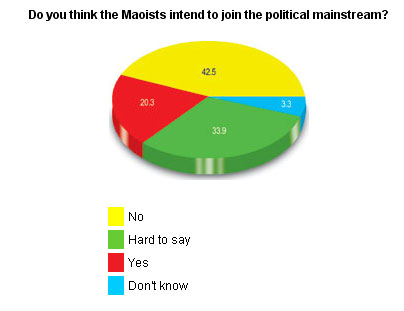 As Nepal marks the start of a new year and a new decade on Monday, the annual Himalmedia public opinion poll shows Nepalis are generally optimistic about the future and have an overwhelming desire for peace.
As Nepal marks the start of a new year and a new decade on Monday, the annual Himalmedia public opinion poll shows Nepalis are generally optimistic about the future and have an overwhelming desire for peace.
This random sample poll was carried out last week by professional enumerators among 1,667 respondents in Kathmandu Valley, Biratnagar, Pokhara, Dhangadi and Mahendranagar and was analysed by the SPSS software.
Highlights:
. A majority favour an all-party consensus for peace talks.
. The king has the biggest responsibility to resolve crisis.
. Rock-bottom confidence in parliamentary parties.
. Even though many want Maoists to give up arms, most are skeptical that they will.
. Most respondents support the Maoists' goals, but are convinced they can be achieved through peaceful means.
It has been observed in past polls that there is usually 2-3% less support for political parties in the towns compared to rural areas. And even though this year's poll was urban-centric, many had recently moved in from the hinterland.
The most surprising result was in response to the question: "If the Maoists laid down their arms and took part in elections today, who would you vote for?" Nearly 21% said they would vote for the Maoists, while nearly 50% were undecided. Support for the other parties were: Nepali Congress 8.3%, UML 7.6%, RPP 3.3%, Deuba Congress 1.6% and "Others" 8.8%. Comparing these figures with Himalmedia polls from previous years, it is clear that the political parties have seen a major erosion of support, while the proportion of undecideds has been growing sharply from14.5% in 1999, 30.1% in 2001 to 38.6% last year (See Nepali Times #114).
 Even so, there seems to be great skepticism that the Maoists are serious about joining the political mainstream. Only 20.3% thought they would, while 42.5% thought they were not serious and nearly 34% found it hard to say. Even though 51% of those surveyed thought the Maoists' three main demands were valid, a full 68% thought they could be achieved through peaceful means.
Even so, there seems to be great skepticism that the Maoists are serious about joining the political mainstream. Only 20.3% thought they would, while 42.5% thought they were not serious and nearly 34% found it hard to say. Even though 51% of those surveyed thought the Maoists' three main demands were valid, a full 68% thought they could be achieved through peaceful means.
As in previous years, it was clear that however dire the state of the country, the majority of respondents did not blame the system but the leaders of the political parties. In response to the question "Who is responsible for the present crisis?" less than 5% blamed parliamentary democracy. More than 60% blamed the political parties and their leaders, 14% blamed the Maoist insurgency, while 4.7% blamed the palace.
Asked what they thought of the present constitution, 26.3% though it was a failure and needed a total overhaul, 44.3% thought it could be amended, while just under 20% said it was ok as it stands. Asked about whether or not a constituent assembly was needed, the result was 55:23 in support, with 22% undecided.



(For full details and analysis of the polls, see the Baisakh 1-15 2060 issue of our sister publication, Himal Khabarpatrika.)


